We recently announced the 2,000th translation of the JESUS film. And with that announcement, we released our world language quiz. This quiz allows respondents to watch a short segment of the JESUS film in 15 languages and attempt to guess which language translation the clip features from multiple options.
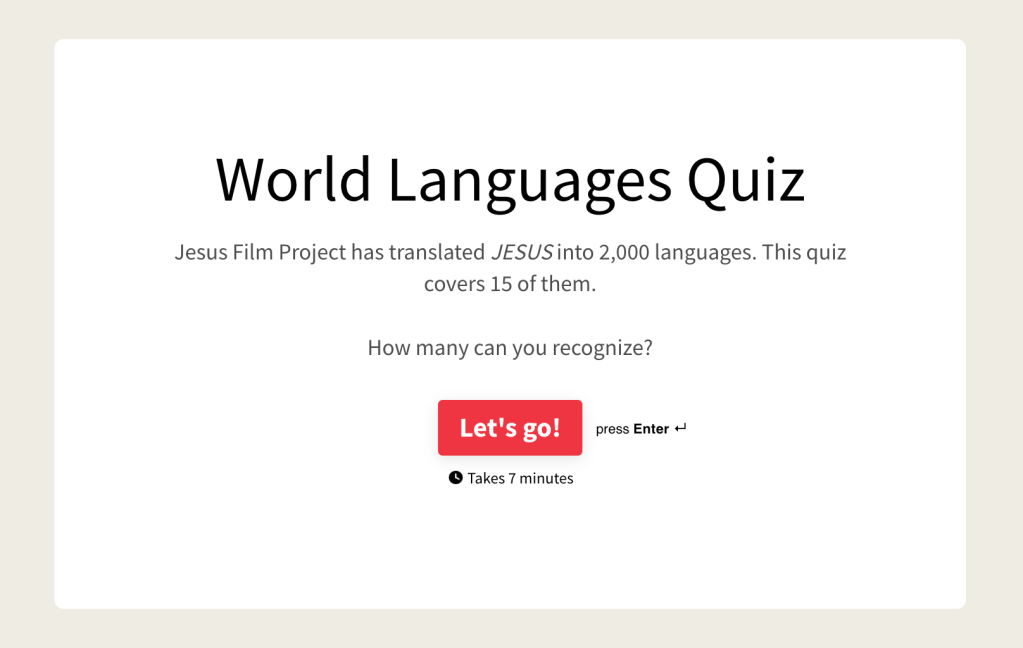
This quiz was more challenging than you might think, as it featured a number of obscure languages, but it allowed us to pull together some interesting insights. Since some of these insights will reveal quiz answers, we want to ensure that you have an opportunity to take the quiz before getting into the results!
Take the World Language Quiz now to see how many languages you recognize, and then come back and learn more about the quiz results!
Overview of the World Language Quiz results
Around 800 individuals started the World Language Quiz, and 563 saw it through to completion, giving us a completion rate of nearly 70.5 percent. For a quiz requiring about 6 minutes to finish (an eternity for online attention spans), 70 percent is incredibly high.
The average quiz taker got 9.47 out of the 15 languages correct (63 percent accuracy).
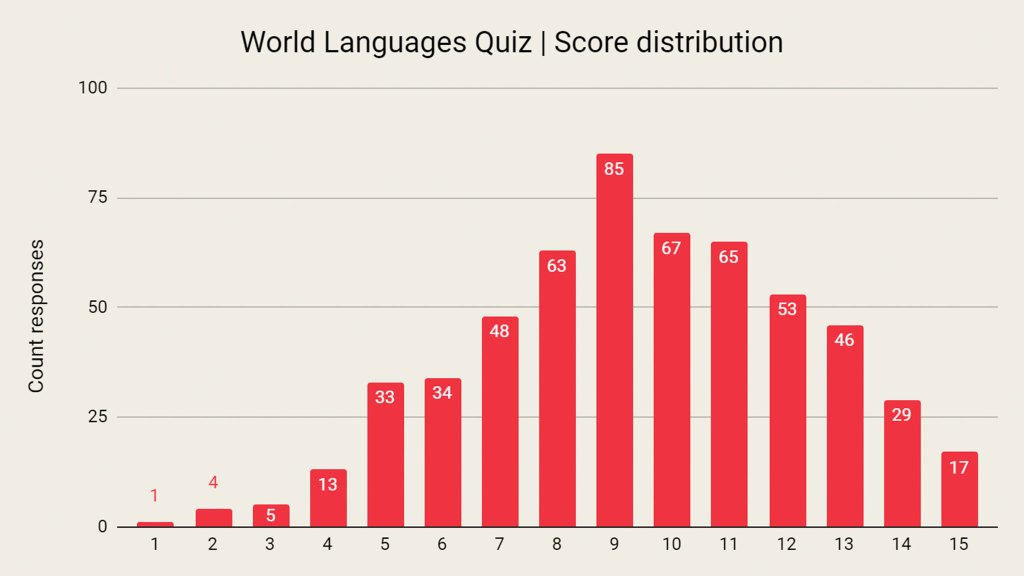
This quiz was a fun way to demonstrate the depth and breadth of languages around the world. There are more than 7,000 languages spoken globally, and they’re distributed in surprising ways. For instance, only about 230 languages are spoken in Europe while 2,197 are spoken in Asia. In fact, there are an estimated 832 languages spoken in Papua New Guinea alone. So it’s not surprising that you might not recognize many of the languages presented in this quiz.
Jesus Film Project® brings the gospel to people around the world, allowing everyone to hear Jesus’ story in their own heart language. We’ve translated the JESUS film into over 2,000 languages, but that’s just the tip of the iceberg. Please consider how you can partner with Jesus Film Project to reach more people with future translations. Language shouldn’t be a barrier to the gospel message.
Let’s examine some of the specifics we learned from the quiz results.
The language of quiz takers
Respondents spoke many languages, running the gamut from Afrikaans to Tibetan. Most of the respondents, however, spoke English (94%).The second most commonly spoken language amongst respondents was German. Bilingual respondents recognized more languages We examined how scores from respondents who spoke multiple languages compared to those who were monolingual.
The average score for monolingual quiz takers was 64.7 percent. Those who spoke two or more languages received a statistically significant increase in their results, averaging 70.8 percent.
In other words, if you spoke more than one language, you tended to do better on the World Languages Quiz.
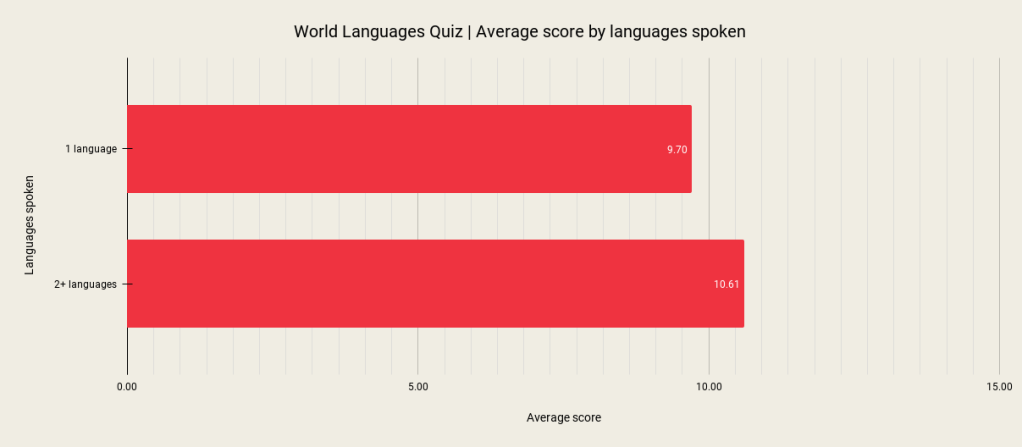
What languages did people recognize most?
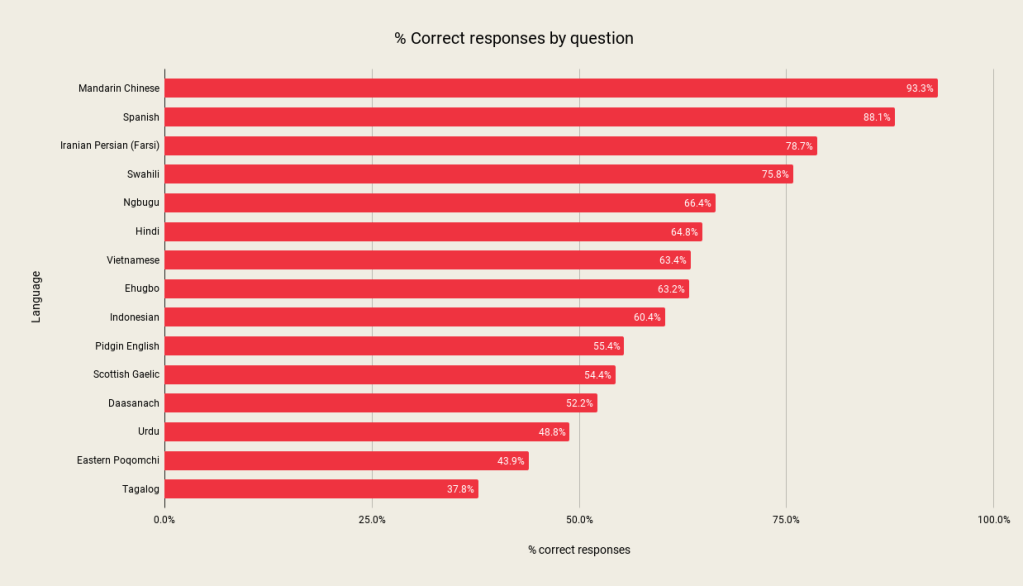
Most respondents recognized Mandarin Chinese, with 93 percent answering correctly. It’s important to note that the multiple-choice element of this quiz likely skewed the results. For instance, the choices available for this question were Russian, Indonesian, Mandarin Chinese, and Hungarian. Through the process of elimination, it may have been easier for quiz takers to land on Mandarin Chinese. It might have had a significant impact on the responses if Cantonese had been one of the options.
The second-highest result was for Spanish, which 88 percent of quiz takers answered accurately. This one probably received a bit of an assist from the potential responses. People were likely able to weed out French and Italian as possible options because they’re relatively recognizable languages. But since Spanish ranks fourth among the world’s most-spoken languages, it was easily chosen over Portuguese as well.
The top five languages guessed correctly were:
| # | Language | Where the language is spoken | Approximate number of native speakers | Percentage correct |
| 1 | Mandarin Chinese | China | 1,118 million | 93% |
| 2 | Spanish | Mexico, Columbia, United States, Argentina, Venezuela, Peru, Chile, Ecuador, Guatemala, Cuba, Spain, Equatorial Guinea | 450 million | 88% |
| 3 | Iranian Persian (Farsi) | Iran, Afghanistan, Tajikistan | 62 million | 79% |
| 4 | Swahili | Tanzania, Kenya, Uganda, Rwanda, Burundi, the Democratic Republic of the Congo (DRC), South Sudan, Somalia, Mozambique, Malawi, Zambia, Comoros, Oman, Yemen | 16 million | 76% |
| 5 | Ngbugu | Central African Republic | 95,000 | 66% |
What were the least recognized languages?
On the other end of the spectrum were the languages that most people didn’t recognize. It’s no surprise that they’re the more obscure languages (none of these are trade languages, and three have 130,000 or fewer speakers).
The five least-recognized languages were:
| # | Language | Where the language is spoken | Approximate number of native speakers | Percentage correct |
| 1 | Tagalog | Philippines | 82 million | 38% |
| 2 | Eastern Poqomchi’ | Guatemala | In total, the eastern and western dialects are spoken by 130,000 people | 43% |
| 3 | Urdu | Pakistan, India, Bangladesh, United Arab Emirates, Saudi Arabia, Afghanistan | 70 million | 49% |
| 4 | Daasanach | Ethiopa, Kenya, South Sudan | 60,000 | 52% |
| 5 | Scottish Gaelic | Scotland, Cape Breton Island, Nova Scotia | 57,000 | 54% |
How did test time affect scores?
As we alluded to earlier, the multiple-choice element of the language quiz had an impact on the outcome. The ability to choose the right language from a handful of options made the quiz a little easier. Weeding out potential languages increased the likelihood of getting answers right, so it would make sense that the more time people spent paying attention to the language and dismissing options, the better the outcome.
We found that there was a direct correlation between the time people spent on the quiz and their score
The average time spent on the quiz was 6 minutes and 7 seconds (roughly 25 seconds per question). Those that spent six or more minutes on the quiz had significantly higher scores than those who spent five or fewer. For this quiz, taking more time generally meant better results.
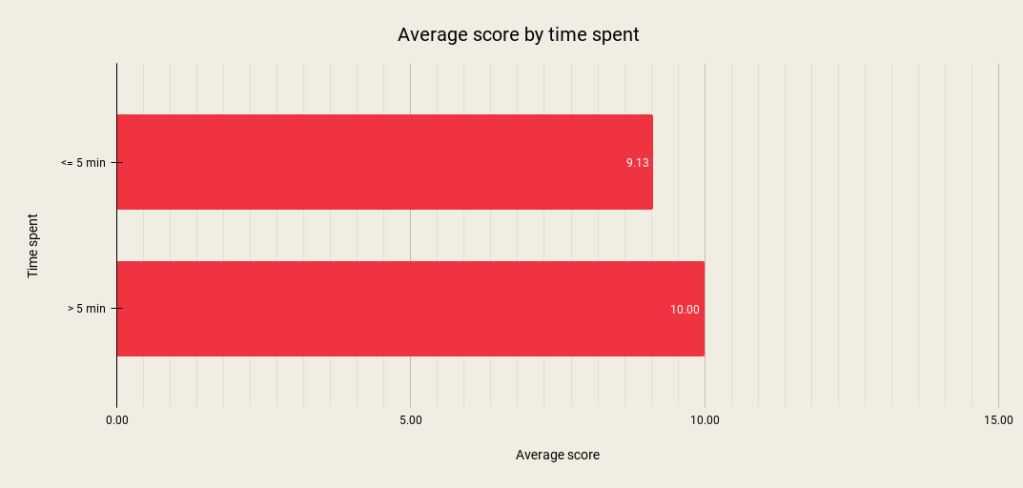
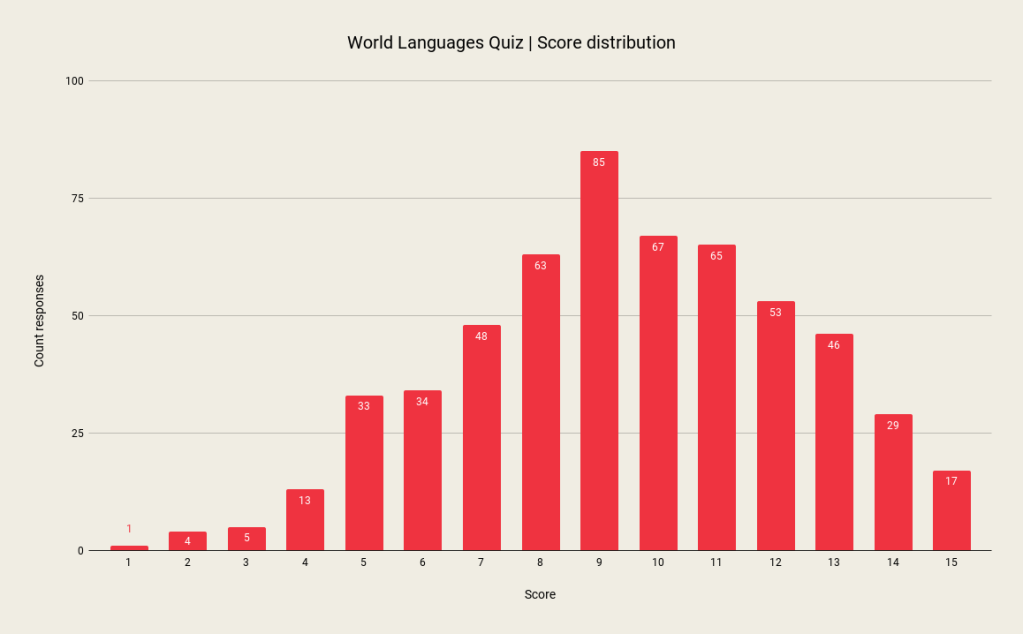
Let’s tell the world about Jesus
We believe that this could be the generation that fulfills the Great Commission, and our 2025 vision helps provide a roadmap to get us there. Help others hear Jesus in their heart language.
Please consider supporting Jesus Film Project with your prayers and financial gifts.
